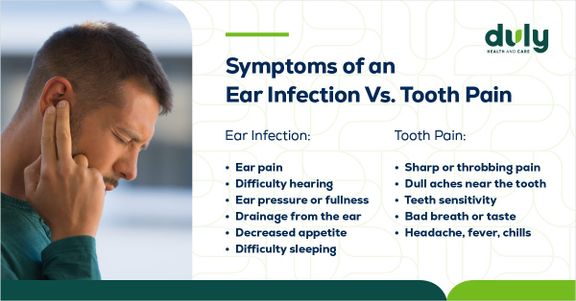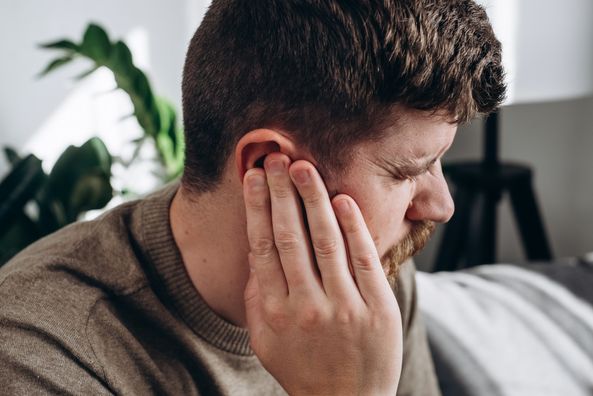You feel a shooting pain in your tooth — or wait, was that pain in your ear? Because your teeth and your ear are so close to one another, it can sometimes be confusing which is causing you pain.
Ear infections and toothaches are both painful, but they’re also both treatable. To get relief, it can be helpful to understand the causes and accompanying symptoms of these conditions. Then you may be able to figure out what’s causing your pain and treat it accordingly.
Here’s an overview of ear infections, tooth pain, and how they are different.
What’s the Difference Between Ear Infections and Tooth Pain?
The primary distinction between ear pain and tooth pain is that ear pain comes from the ear itself, while tooth pain usually originates from a specific tooth.
Ear Infections
An ear infection — also called acute otitis media — is an infection that occurs in your middle ear. This is the space between the eardrum and the inner ear. It’s filled with air as well as tiny bones that send vibrations from your eardrum to your inner ear, allowing you to hear.
Ear infections occur mostly in children between the ages of 6 months and 2 years, and they remain common until 8 years old. However, older children and adults can also get ear infections — and they can be just as painful.
Viruses and bacteria can cause ear infections. They usually occur right after a cold or other type of upper respiratory infection, when germs make their way into your middle ear.
If you think you’re experiencing an ear infection, visit a Duly Health and Care primary care provider clinic near you for diagnosis and treatment.
Find Primary Care near you >
Tooth Pain
Pain in your tooth — often referred to as a toothache — can occur in or around your tooth. Toothaches can range from minor to severe, some of which will go away on their own and others that will need medical treatment.
Toothaches have a wide range of causes, including cavities, a cracked tooth, teeth grinding or clenching (called bruxism), gum disease, or a damaged dental restoration, such as a filling or crown.
Ear Infection or Tooth Pain: Which Symptoms Do I Have?
Pain in and around your ear and teeth can range from minor to severe. Both ear infections and tooth pain can feel anywhere from slightly frustrating to debilitating enough to keep you from going about your day.
But in order to get the right treatment, you’ll have to know which one you have. A key way to tell the two apart is to determine where the pain is coming from: your mouth or your ear. But if the pain is too close to tell, there are other symptoms to look for that may give you clearer clues:

How Will My Doctor Diagnose My Pain?
To diagnose an ear infection, your healthcare provider will ask about your symptoms and do a physical exam. During the exam, they’ll check for cold symptoms as well as an infection in your ear. To view inside your ear, they’ll use an instrument with a light (called an otoscope) to look for signs of an ear infection, including inflammation, redness, and swelling.
As for tooth pain, diagnosing the cause of your discomfort may require a visit to the dentist, where they’ll ask about your symptoms and do an examination of your teeth and mouth. They might also take an X‑ray to view beneath your gums.
Are Ear Infections and Tooth Pain Treated Differently?
Most of the time, ear infections don’t require treatment. But when they do, treatment usually includes antibiotics and over-the-counter pain medications. Children who have recurring ear infections may need ear tubes, which allow air into the middle ear, letting fluid drain more easily.
When it comes to tooth pain, you can try at-home remedies first. You might try rinsing with salt water (mix 1⁄2 teaspoon of salt and 8 ounces of warm water) or applying ice packs to the affected area. If your pain doesn’t go away, you’ll need to visit your dentist, who can treat your tooth pain with medication (such as antibiotics and pain relievers), fillings, crowns (a cap that goes over your tooth), or other dental treatments, depending on the cause of the pain.
What Else Could My Ear and Tooth Pain Be Caused By?
If your symptoms don’t align with an ear infection or the typical causes of tooth pain, it might be something else causing your pain. Other related conditions include:
- Sinus infections, which can lead to pain in your teeth, ears, and face, among other symptoms
- TMJ disorders, which cause pain in the jaw joint and the muscles that move your jaw
- Trigeminal neuralgia, which affects the trigeminal nerve that sends feeling from your face to your brain and causes pain that feels like an electric shock on one side of your face
- Visceral toothache, which is redirected pain from the stomach or heart
- Neurovascular orofacial pain, which is similar to a migraine and can cause pressure and aching in the teeth
How Do I Know Where My Pain Is Coming From?
If you aren’t sure what’s causing your pain, talk to your Duly Health and Care primary care provider or go to an immediate care location for diagnosis and treatment. Not delaying care is crucial in order to prevent problems from getting worse.
Find Primary Care near you >
No one should have to deal with ear, tooth, or any other kind of discomfort. With the right diagnosis and care, you can find relief from your pain.
Health Topics:








